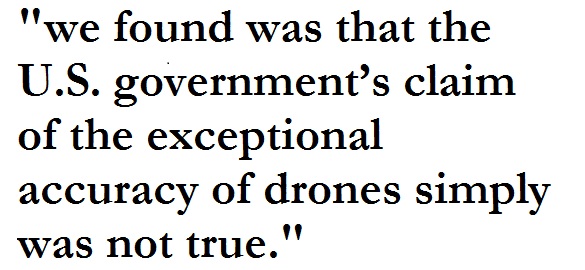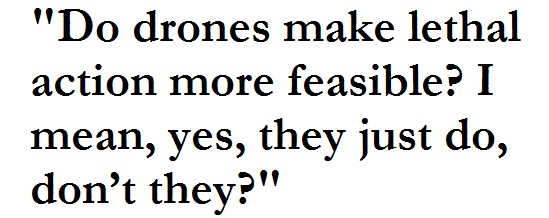
Nobody outside of the U.S. government knows exactly how many drone strikes have happened in the War on Terror. But we do know a great deal more than we would have known if it hadn’t been for the work of Alice K. Ross. Ross heads The London-based Bureau of Investigative Journalism’s Covert Drone War project, which has carried out extensive research into covert operations in Pakistan, Afghanistan, Yemen and Somalia. By meticulously investigating the history of drone operations, The Bureau has provided much of the statistical infrastructure for the contemporary drone debate. This makes Alice, who speaks about transparency and facts with all the vigor of the muckracking journalist archetype, an extremely influential figure.
On a sunny but cold day during a recent visit to the U.S., Alice took time from a packed schedule to talk with Arthur Holland Michel on a park bench at the busy intersection of Christopher St. and 7th Ave., in Manhattan’s West Village.
Alice is currently developing Naming the Dead, an ambitious initiative to compile and publish biographical information about people who have been killed in drone strikes. She lives in London.
Interview by Arthur Holland Michel
Center for the Study of the Drone How did you get into this line of work?
Alice Ross I joined the Bureau to work on a project to address what we felt at the time was an underreporting of civilian casualties in drone strikes in Pakistan. We were concerned about statements being made by senior U.S. officials—statements that were going unchallenged—that drones were killing no civilians at all. We suspected that that wasn’t the case. There were fairly well reported incidents of civilian casualties and yet nobody was effectively challenging the claims of the extreme precision of drones. We started by gathering together and mapping the media reports of every incident, and listing all the incidents of drones causing civilian harm. We tallied how many people had been killed in each incident. We found that there were credible reports of well over 100 civilians being killed, including 97 children.
Then at the end of June, 2011, John Brennan made a speech in which he said that no civilian had been killed in a drone strike in nearly a year. We worked with local reporters to carry out field investigations on ten strikes within the year-long window mentioned by Brennan. In these ten strikes, we found evidence of at least 45 civilian casualties, when Brennan had said no civilians at all had died. We also identified 15 further strikes in that year-long period that we felt needed urgent investigation as the reporting strongly suggested large numbers of further civilian casualties.
said that no civilian had been killed in a drone strike in nearly a year. We worked with local reporters to carry out field investigations on ten strikes within the year-long window mentioned by Brennan. In these ten strikes, we found evidence of at least 45 civilian casualties, when Brennan had said no civilians at all had died. We also identified 15 further strikes in that year-long period that we felt needed urgent investigation as the reporting strongly suggested large numbers of further civilian casualties.
So what we found was that the U.S. government’s claim of the exceptional accuracy of drones simply was not true. From that point we have kept logging drone strikes. We’ve branched out to investigate drone strikes in Yemen and Somalia. We’ve carried out field investigations into tactics such as double taps, when drones return to attack rescuers, something which Christof Heyns, the U.N. special Rapporteur, said may well be a war crime.

Drone And what had you been doing before that?
Ross I had worked in magazines for a number of years, and I did an investigative journalism masters at City University London, which is where the Bureau is located. So I went straight from doing the course to working at the Bureau.
Drone Did you have a specific interest in drones before joining the Bureau?
Ross No, I didn’t. One of the things I wanted to be when I was growing up was a war reporter. But I sort of let go of that dream, as you do. So when they told me at the Bureau, “You’re going to start working on drones,” I was instantly and completely captivated by the subject. I think it is such an important area of research and it’s held me completely fascinated. I think that what we’re looking at is the intersection of combat strategies and new technologies, which raises really important and profound questions about the way that we fight, and about human rights and about technologies and ethics.
Drone The Bureau’s research project is centered around the idea of the drone, and yet the investigation takes in all sorts of military platforms. In your investigation on Somalia, you cover cruise missile strikes, and naval bombardments, and strikes by manned aircraft. And yet the salient term is “drones.”
Ross Drones. Yes.
Drone Why is that the strategy of the Bureau?
Ross Our earliest research was in Pakistan, and Pakistan is entirely a drone conflict. What we found when we started looking at drones in Yemen and Somalia was that we’re not really looking at drones in isolation; we’re looking at a variety of military tactics. Cruise missiles, missile strikes, manned aircraft, gunships, abductions, and so on. To us, the unifying factor in all of these conflicts is that since they take place far from the formal battlefield, they raise the same human rights concerns. Whether you’re hit by a cruise missile or a drone, it raises the same human rights and international law issues. The military platform doesn’t really matter, it’s the impact that matters. It’s the ethical implications of waging a thirteen year conflict in the shadows.
Drone I want to push you on that. Some sectors of the pro-drone community make the argument that targeted killing is the same whether it’s a cruise missile or a drone or a commando using a high powered rifle. It’s an argument that’s used to counter those in the human rights community who declare “We’ve got to stop using drones.”

Ross Well, in Yemen, we have looked at a number of incidents where we cannot say whether they have been carried out by drones or by manned aircraft. Should we be excluding those incidents? No I don’t think we should. Should we not be tracking them, just because drones weren’t involved? No, I think we absolutely should be tracking and monitoring those strikes. The angle that we’re going for is this: people are being killed in an unaccountable fashion. That’s our focus.
Drone What do you make of the argument that drones are just a weapon, and that it’s the policies and actions that make use of the weapon that need to be scrutinized.
Ross I mean, drones are a weapon, and the key thing about a weapon is that it depends on how the weapon is used. I wouldn’t necessarily class that as a pro drones argument. But the question is whether drones make it easier. Do drones make lethal action more feasible? I mean, yes, they just do, don’t they? It’s a facilitating technology.
That being said, we are a journalistic organization, not a campaigning organization. We are not pro-drone or anti-drone. We strive for objectivity. Obviously perfect objectivity is never achievable, but we do strive to portray both sides. We’re guided by the data, so when we see a steep drop in drone strikes in civilian casualties, of course we report that. While we’re delighted when advocacy groups use our material, we don’t see ourselves as an advocacy group.
Drone You just returned from Pakistan. What have you been up to there?
Ross I was working on a new project called Naming the Dead. This is an attempt to identify and name as many as we can of the 2,500 or more people who have been killed by drone strikes in Pakistan. One of the things that we kept coming back to in our earlier research on drone casualties was that while we have a fairly good idea of how many people have been killed, we don’t know very much about who they are. We have launched a database of as many of the people killed as we can. We’ve identified about 570 people at launch, and we’re going to build on that.
We’ve translated it all into Urdu, so that people in Pakistan can read it. We’re hoping that people in Pakistan will contribute to it. The aim is to come to an understanding of the human cost of drone strikes, and to have a more informed debate about the accuracy and about the effectiveness of drones. So for example, people killed in strikes are often described simply as “militants.” Naming the Dead is asking, “Who are these people, and when we say militants, what exactly do we mean?”
Drone What do you think is the benefit of learning the names and the identities of people who have been killed, as opposed to just receiving detailed statistics?
Ross One of the claimed justifications for the use of drones in Pakistan is that the conflict is one of self defense against Al Qaeda and its affiliates. With more information about who’s being killed, you can start to really drill into those arguments; you can start to assess what sort of threat these individuals really pose. This conflict is reported in numbers, and yet these are real people who are dying. And I think that when you see these people as individuals, you can start to understand a little bit more about the impact that the drones are having. With a little more information, we can have a much better debate about the issue.
Drone Instead of looking at an abstracted, undifferentiated mass…
Ross Exactly.
Drone …represented by a single number.
Ross Exactly. If these people were being killed in Europe or in the U.S.A., there would be profiles for every single one of them in the newspapers. Why should there be less information available on Pakistani victims? Why shouldn’t that happen just because they’re in Pakistan?
Drone Have you had any resistance to this project from the C.I.A., or the Department of Defense?
Ross When we first published, we went to the C.I.A.—as we do every time—to give them a right to reply. They responded that any reports of large numbers of civilians are being killed are ludicrous. I believe they called it “disinformation.” But we provide sources for all of the claims that we make. We have been really careful to track sources for every single claim. We’ve got hundreds of sources reporting many civilian deaths. So the claim that it’s ludicrous is…
Drone Ludicrous?
Ross Exactly. Simply based on the information that is in the public domain there is evidence of civilian casualties many times the number that the C.I.A is claiming. And the claim now is that it’s disinformation. So that has been one negative response.
Drone Tell me a bit about drone use in the British military.
Ross At the moment, three countries operate armed drones: Israel, the United States, and the United Kingdom. This makes Britain a really key player in this early stage of drone conflict. British pilots have flown drones in Iraq as far back as 2008. Britain flew drones in the U.S. supported mission in Libya, and Britain now has its own small drone fleet in Afghanistan. Britain operates five drones at the moment. It’s about to double the size of its fleet to ten drones. And yet in recent years it carried a third of all drone strikes in Afghanistan. Considering the size of its drone fleet, Britain is carrying out a startling proportion of all the drone strikes in Afghanistan. What we don’t know is who those missiles are being fired at, who they’re killing. The British government has admitted to a single incident of civilian harm. Considering that Britain has carried out nearly 300 drone strikes in Afghanistan, that is a civilian harm rate of .3%. Meanwhile, our work in Pakistan has found that 18% of all drone strikes have reportedly killed at least one civilian. It just seems completely implausible to us, and yet we cannot get transparency from the British government. It’s strange when you realize that we understand far more about the C.I.A.’s supposedly uber-secret drone strikes in Pakistan than we understand about British military operations in Afghanistan.
Drone In America there’s some talk about the possibility of a drone strike on a U.S. citizen on U.S. soil. Is there any record of a British citizen being killed in a drone strike and is there any discussion about the prospect of a drone strike happening in Britain?
Ross The British imagination has not yet begun to contemplate drone strikes on British soil, partly because a lot of people genuinely don’t realize that British drones are really in operation.  The subject of drones has a much lower profile in Britain than it has in America. It’s much less embedded in the public consciousness at the moment. However, our research in Pakistan has shown that a number of foreigners—U.S. citizens, and European citizens—have died in drone strikes in Pakistan, and the greatest proportion of those have been British citizens. At least half a dozen British citizens have reportedly been killed in drone strikes in Pakistan. A number of young British men have been drawn towards terrorism and have found themselves in Waziristan. In Somalia, two drone strikes have killed individuals who had British citizenship, but who subsequently lost it prior to the strikes.
The subject of drones has a much lower profile in Britain than it has in America. It’s much less embedded in the public consciousness at the moment. However, our research in Pakistan has shown that a number of foreigners—U.S. citizens, and European citizens—have died in drone strikes in Pakistan, and the greatest proportion of those have been British citizens. At least half a dozen British citizens have reportedly been killed in drone strikes in Pakistan. A number of young British men have been drawn towards terrorism and have found themselves in Waziristan. In Somalia, two drone strikes have killed individuals who had British citizenship, but who subsequently lost it prior to the strikes.
Drone What do you predict will happen with U.S. and British drone operations in the near future? Do you think the downward trend in the frequency of strikes will continue?
Ross Well, the U.S. government has said it anticipates that there will be less of a role for drones in Pakistan as forces leave Afghanistan. So on that basis you would expect for there to be a decline in strikes. However, as we saw in Yemen in July and August of this year, there was a marked escalation in drone strikes in response to the embassy bomb threats. So though drone strikes are predicted to fall over the next few months, this does not necessarily mean that that there will be a permanent decline in the number of strikes.
Drone Beyond merely investigating and reporting, what is your goal? How do you want to make a difference?
Ross When we first started reporting on drones…
A firetruck drives past with its sirens blaring.
Drone Hold on a second Alice. We are having a slight emergency situation here in the West Village.
Ross God that’s a cool fire-engine. It looks like a 50s diner, doesn’t it? This place is amazing! When we first started reporting on drones, there was very little attention being paid to drones. Two years later, there are numerous academic studies about drones, and even President Obama has stood up and made a speech specifically addressing drones and counterterrorism operations in Pakistan and Yemen. He has specifically addressed some of the issues that we raised at the Bureau. Civilians now have an increased awareness about these issues. That on its own is a result. Though it’s not just thanks to our work. It’s really important for me to mention the New America Foundation and the Long War Journal. These organizations have done really important work tracking drone strikes, as have the teams at Stanford and NYU and Columbia. But I think the Bureau has made a contribution. I would say that raising awareness and aiming to bring transparency to a subject that has really been dominated by obscurity, that is an end in itself. And so far we have had tangible results.
[includeme file=”tools/sympa/drones_sub.php”]

